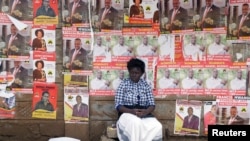Kenyans hoping to watch a televised debate between vice-presidential candidates in next month's election were left disappointed on Monday when only one of six meant to be on stage was left fielding questions alone for an hour.
Surrounded by five empty podiums, Eliud Muthiora Kariara, a former banker turned running mate to independent presidential candidate Japhet Kavinga Kaluyu, answered questions posed by two moderators and the audience.
Why the other candidates were not present was unclear although some had already voiced objections to the debate format. Broadcasters had planned to have six minor candidates, including Kariara, take the stage first, with the front-runners from the two biggest parties facing off separately later.
A letter signed by the six and released on Sunday had said they intended to show up as long as all eight vice-presidential candidates would be debating simultaneously.
"We made it clear that we shall take part at 8pm Debates that was to bring all candidates together," Ekuru Aukot, presidential candidate for Third Way Alliance, said on Twitter to explain why his running mate did not take part.
He also rejected reports in local media that some candidates had arrived late and not been allowed in.
"This is documented. We arrived in time," he said.
Kenya's current deputy president, William Ruto, said on Twitter that he had not been given details of the event.
"I am surprised no one has engaged me on the debate. Courtesy demands that date, time, rules of engagement would have been made available," Ruto tweeted on Sunday.
But Debate Media Limited, the alliance of broadcasters that organized the debate, said in a statement that all the campaigns had been informed. It noted that one minor candidate had even lodged a court case insisting he should share the podium with the two larger parties.
"The suggestion that the campaigns did not know about these debates is therefore at best dishonest," the statement said.
Kenya will also choose legislators and local representatives in the Aug. 8 polls, which will see incumbent President Uhuru Kenyatta challenged by veteran opposition leader Raila Odinga, the head of the National Super Alliance (NASA).
Odinga also ran in 2007, when a disputed presidential poll sparked violence that killed 1,200 people, and in a peaceful election in 2013.
Both major parties have published manifestos, although Kenyan voters have often split along ethnic lines in previous elections.
According to polling firm IPSOS, the ruling party and NASA are likely to take about 90 percent of the vote, while none of the six independent presidential candidates is polling above 1 percent.
Vice-presidential candidate Kariara used his unexpected place in the spotlight on Monday to call for leadership "to take Kenya to the next level".
"There has been so much talk. What Kenya needs is action," he said.





